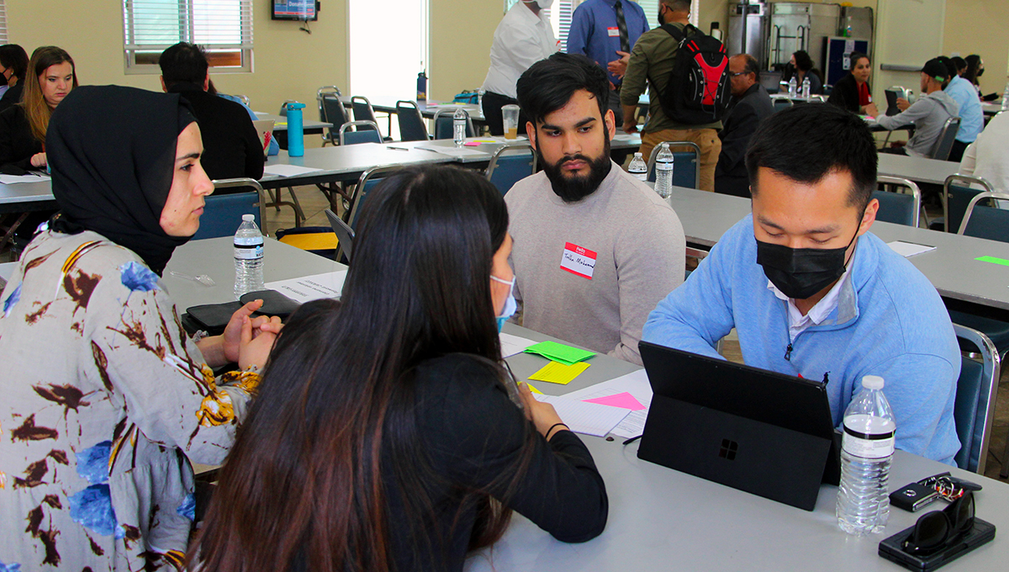Afghan Refugee Immigration Referral Service Platform
CAIR-LA has been at the forefront of assisting hundreds of Afghan refugees with rapid-response immigration assistance. . But Afghan arrivals need additional resources to become self-sustaining after they receive immigration support. Help establish a platform for referrals for all LA Afghan arrivals today.

What is the primary issue area that your application will impact?
Immigrant and Refugee Support
In which areas of Los Angeles will you be directly working?
Central LA
East LA
San Gabriel Valley
San Fernando Valley
South LA
West LA
South Bay
County of Los Angeles
City of Los Angeles
In what stage of innovation is this project, program, or initiative?
Applying a proven model or solution to a new issue or sector (e.g., using a job recruiting software or strategy to match clients to supportive housing sites, applying demonstrated strategies from advocating for college affordability to advocating for housing affordability and homelessness, etc.)
What is your understanding of the issue that you are seeking to address?
Over 2,100 Afghans have arrived in the Los Angeles region and need support with asylum applications. These new arrivals are provided a time-limited case manager to guide them through residency in the US but get left behind when it comes to building a sustainable lifestyle after that period is up. CAIR-LA will provide them with linguistically and culturally sensitive services, including legal asylum clinics. We plan to offer Afghan refugees various onboarding methods to ensure greater accessibility and stability as they settle in. In addition to food security, health services, education (both long term and ESL courses), CAIR-LA is seeking to address the following 3 main issues: (1) Needing to apply for asylum within 1 year of arriving to LA County, (2) Housing issues, (3) Securing a job. Once CAIR-LA assists Afghan arrivals with asylum, then we can make the necessary referrals to assist them with other necessities like housing and employment.
Describe the project, program, or initiative this grant will support to address the issue.
CAIR-LA plans to continue offering consultation, affirmative immigration application assistance, referral system for social services, educational and advocacy outreach, community mobilization, and infrastructure development to increase our capacity to serve Afghan arrivals. Thanks to our collaboration with various state/county/nonprofit groups, we are able to provide Afghan arrivals with wrap-around services and rapid-response support in the form of housing, food assistance, legal services, mental health counseling, etc. To bolster support and clarify a path to success, we want to build out a “one-stop-shop” that is a proper network of referrals and resources that fulfill the various needs of this community. By simplifying and centralizing resource referral, we can strengthen this community and provide them with the much-needed stability and comfort as they transition into their new lives. In addition, to better serve Afghan arrivals, beyond our legal services and asylum assistance, CAIR-LA will develop a Resources & Referrals Platform (RRP). RRP will serve as a one-stop online solution where arrivals can easily access a variety of resources and referrals, in languages they speak, to wrap-around services, such as social services, food, employment, housing, and so on. The platform will also host resources regarding non-immigration legal assistance, such as our civil rights services, and other legal matters beyond our expertise that our partners will be able to provide.
Describe how Los Angeles County will be different if your work is successful.
Success overflows from one segment of life to the next. By providing these Afghan arrivals with a centralized platform, such as RRP, that leads to empowerment and stability in their housing, food, education, language, and career needs, they will gain security and confidence. This in turn will allow them to provide their skills and knowledge to the LA county by participating in our economy, contributing to the workforce, learning in our school system, and providing a personal narrative into the diverse fabric of LA life. Over the grant period, we hope to develop a centralized platform that will act as a “one-stop-shop” for all needs that the Afghan arrival community might need. The platform will provide direction, referral, and resources for housing, food security, health services, education, jobs, ESL courses, etc.
What evidence do you have that this project, program, or initiative is or will be successful, and how will you define and measure success?
CAIR-LA has successfully been able to assist Afghan arrivals by organizing 4 asylum clinics, holding KYR presentations for the benefit of 1,500 people, and referring 300 individuals seeking other social services and are working with partners to access these services. We have completed 500 intakes and 75 cases, and have 425 additional cases to complete, with over 1,000 on the waiting list. Our Resources & Referrals Platform (RRP) will also be used to measure our impact. The platform will collect unidentifiable and anonymous data about its usage, such as the type of most requested services and referrals, the number of arrivals accessing it, usage frequency, languages spoken, age, gender, education and employment status…etc. The platform will also include a feedback section where we can directly collect comments and feedback from the platform users. This will help us not only track RRP’s performance, but also identify potential gaps in fulfilling the needs of the Afghan arrivals.
Approximately how many people will be impacted by this project, program, or initiative?
Direct Impact: 100
Indirect Impact: 1,700
Describe the specific role of the partner organization(s) in the project, program, or initiative.
.